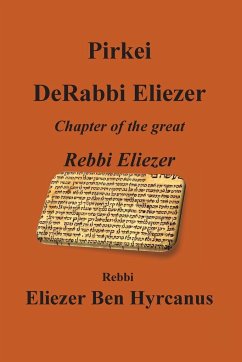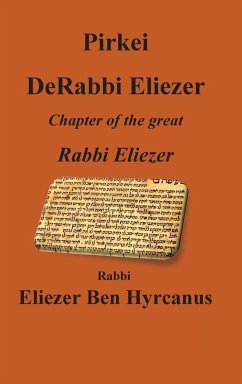![Pirkei Avot - Ethics of the Fathers [Rabbeinu Yonah] Pirkei Avot - Ethics of the Fathers [Rabbeinu Yonah]](https://bilder.buecher.de/produkte/69/69447/69447656z.jpg)
Pirkei Avot - Ethics of the Fathers [Rabbeinu Yonah]

PAYBACK Punkte
9 °P sammeln!
Rabbeinu Yonah Gerondi Yonah son of Avraham the Gironan, also known as Yonah of Girona and Rabbeinu Yonah was a Catalan rabbi and moralist, cousin of Nahmanides. He is most famous for his ethical work The Gates of Repentance and interpretation on Pirkei Avot - The Ethics of our Fathers.Much of what is known about his life comes from a response by Solomon ben Simon Duran, one of his descendants.Rabbeinu Yonah Gerondi came from Girona, in Catalonia [present-day Spain]. He was the most prominent pupil of Solomon ben Avraham of Montpellier, the leader of the opponents of Maimonides' philosophical ...
Rabbeinu Yonah Gerondi Yonah son of Avraham the Gironan, also known as Yonah of Girona and Rabbeinu Yonah was a Catalan rabbi and moralist, cousin of Nahmanides. He is most famous for his ethical work The Gates of Repentance and interpretation on Pirkei Avot - The Ethics of our Fathers.Much of what is known about his life comes from a response by Solomon ben Simon Duran, one of his descendants.Rabbeinu Yonah Gerondi came from Girona, in Catalonia [present-day Spain]. He was the most prominent pupil of Solomon ben Avraham of Montpellier, the leader of the opponents of Maimonides' philosophical works, and was one of the signers of the ban proclaimed in 1233 against The Guide for the Perplexed and the Sefer ha-Madda. According to his pupil, Hillel ben Samuel, Gerondi was the instigator of the public burning of Maimonides's writings by order of the authorities at Paris in 1233, and the indignation that this aroused among all classes of Jews was mainly directed against him. Subsequently, not forty days afterward, as tradition has it, but in 1242 when twenty-four wagon-loads of Talmuds were burned at the same place where the philosophical writings of Maimonides had been destroyed, Rabbeinu Yonah saw the folly and danger of appealing to Christian ecclesiastical authorities on questions of Jewish doctrine, and publicly admitted in the synagogue of Montpellier that he had been wrong in all his acts against the works and fame of Maimonides.As an act of repentance, he vowed to travel to Israel and prostrate himself on Maimonides' grave and implore his pardon in the presence of ten men for seven consecutive days. He left France with that intention but was detained, first in Barcelona and later in Toledo. He remained in Toledo and became one of the great Talmudical teachers of his time. In all his lectures he made a point of quoting from Maimonides, always mentioning his name with great reverence. Rabbeinu Yonah's sudden death from a rare disease was considered by many as a penalty for not having carried out the plan of his journey to the grave of Maimonides. However, some believe this was only a myth created by the followers of Maimonides. He died in Toledo in the Kingdom of Castile in November 1263. The text of his tombstone was later transcribed by Samuel David Luzzatto, with the month and possibly the day of his death being readable.Rabbeinu Yonah left many works, of which only a few have been preserved. The Hiddushim to Alfasi on Berakhot which are ascribed to "Rabbenu Yonah" were in reality written in Gerondi's name by one, if not several, of his pupils. The ¿iddushim originally covered the entire work of Alfasi, but only the portion mentioned has been preserved. Rabbeinu Yonah wrote novellæ on the Talmud, which are often mentioned in the responsa and decisions of his pupil Rabbi Solomon Aderet and of other great rabbis, and some of which are incorporated in the Shi¿¿ah Mekubbe¿et of Rabbi Bezalel Ashkenazi. Azulai had in his possession Rabbeinu Yonah novellae on the tractates Baba Batra and Sanhedrin, in manuscript. His novellæ on the first-named tractate have since been published under the name Aliyot de-Rabbenu Yonah while those on the last-named tractate form part of the collection of commentaries on the Talmud by ancient authors published by Avraham ben Eliezer ha-Levi under the title Sam ¿ayyim. Rabbeinu Yonah's commentary on Pirkei Avot - Ethics of the Fathers is the greatest and most beautiful commentary. His is more in-depth compared to those of Rashi and the Rambam.



![Pirkei Avot - Ethics of the Fathers [Rabbeinu Yonah] Cover Pirkei Avot - Ethics of the Fathers [Rabbeinu Yonah]](https://bilder.buecher.de/produkte/69/69477/69477604n.jpg)


![Sha'arei Teshuvah - Gates of Repentance [Rabbeinu Yonah] Cover Sha'arei Teshuvah - Gates of Repentance [Rabbeinu Yonah]](https://bilder.buecher.de/produkte/69/69840/69840551n.jpg)
![Sha'arei Teshuvah - Gates of Repentance [Rabbeinu Yonah] Cover Sha'arei Teshuvah - Gates of Repentance [Rabbeinu Yonah]](https://bilder.buecher.de/produkte/69/69841/69841333n.jpg)


![Pirkei DeRabbi Eliezer - Chapter of the great Rebbi Eliezer [Hebrew With English Translation] Cover Pirkei DeRabbi Eliezer - Chapter of the great Rebbi Eliezer [Hebrew With English Translation]](https://bilder.buecher.de/produkte/70/70416/70416540n.jpg)

